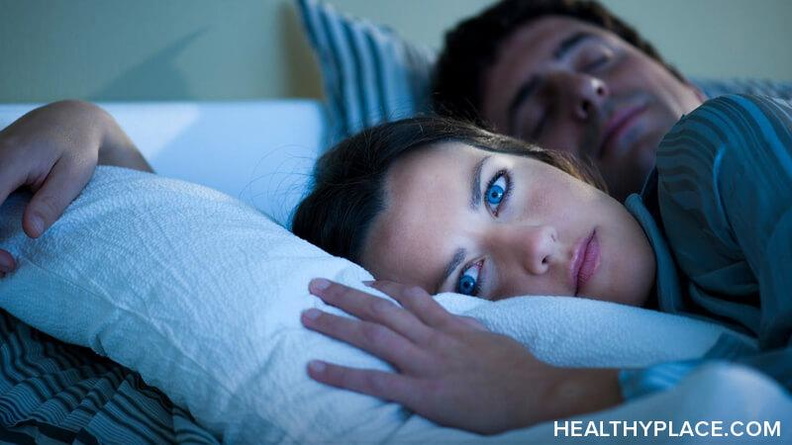Combat PTSD and Sleep Disturbances

Sleep disturbances are very common in combat posttraumatic stress disorder (PTSD). In fact, two types of sleep disturbances -- nightmares and insomnia -- are actually diagnostic criteria for PTSD. We’re not sure why PTSD affects sleep so profoundly but research is getting closer to finding out. But can sleep disturbances in combat PTSD be treated and if so, how?
Types of Sleep Disturbances in Combat PTSD
As stated, the two most common types of sleep disturbances in combat PTSD are nightmares and insomnia. Other known types of sleep disturbances include:
- Sleep avoidance
- Sleep terrors (a sleep disorder different from a nightmare in that the person partially wakens in a state of deep terror)
- Nighttime anxiety attacks
- Movement during sleep
- Vocalization during sleep
- Acting out of dreams
- Sleep apnea
Effects of Combat PTSD Sleep Disturbances on Daily Life
 Of course, we all know what it’s like to wake up in a bad mood because we didn’t sleep well the night before, but for those with combat PTSD, the negative effects on daily life go far beyond that. It has been shown that these sleep disturbances independently make PTSD symptoms worse and worsen clinical outcomes for the patient.
Of course, we all know what it’s like to wake up in a bad mood because we didn’t sleep well the night before, but for those with combat PTSD, the negative effects on daily life go far beyond that. It has been shown that these sleep disturbances independently make PTSD symptoms worse and worsen clinical outcomes for the patient.
According to studies, effects of combat PTSD-related sleep disturbances include:
- An increase in the severity of depression
- Suicidality
- Psychiatric distress
- Poorer quality of life and functioning
- Poorer physical health
- Increased drug and alcohol use
Additionally, these types of PTSD-related sleep disturbances may be resistant to what we normally consider first-line treatment options for sleep disturbances. One example of this is benzodiazepines which have shown to be ineffective in combat PTSD sleep disturbances but are still commonly used.
Treating Combat PTSD-Related Sleep Disturbances
That said, there are ways that have been shown to effectively treat sleep disturbances in combat PTSD. Both medication and behavioral interventions can be used to alleviate the problem, particularly nightmares and insomnia.
According to the study, Sleep-specific Mechanisms Underlying Posttraumatic Stress Disorder: Integrative Review and Neurobiological Hypotheses, prazosin (Minipress, an alpha-blocker) can effectively reduce nightmares and insomnia in PTSD. Additional pharmacological strategies that may help sleep disturbances in combat PTSD include:
- An antidepressant augmented with olanzapine (Seroquel, an atypical antipsychotic)
- Zolpidem (Ambien, a sleep medication)
- Buspirone (BuSpar, used to treat anxiety and nervousness)
- Gabapentin (Neurontin, an anticonvulsant generally used to treat seizure disorders)
- Mirtazapine (Remeron, an antidepressant)
For more information on the above psychiatric medicines, see Psychiatric Medicines Pharmacology.
Imagery rehearsal therapy (IRT) is a common behavioral therapy for combat PTSD-related nightmares. In IRT, a patient would select a nightmare and write down the dream but with a change to some aspect of the nightmare that makes it less disturbing. The patient would then rehearse the dream when awake. The hope is that this new version of the dream would eventually eclipse the previous nightmare (Guided Image Therapy).
Additionally, versions of cognitive behavioral therapy have been shown to reduce insomnia.
Dealing with Sleep Disturbances in Combat PTSD
The important thing to remember when dealing with sleep disturbances in combat PTSD is that they are important to deal with and will harm your health if left untreated. So make sure you tell your healthcare provider about any sleep disturbances you may be experiencing so he or she can select the best treatment option for you. Restless or anxious nights don’t have to last forever.
You can also connect with Dr. Harry Croft on his website, Google+, Facebook, and Linkedin.
APA Reference
Croft, H.
(2015, August 28). Combat PTSD and Sleep Disturbances, HealthyPlace. Retrieved
on 2026, March 3 from https://www.healthyplace.com/blogs/understandingcombatptsd/2015/08/combat-ptsd-sleep-disturbances
